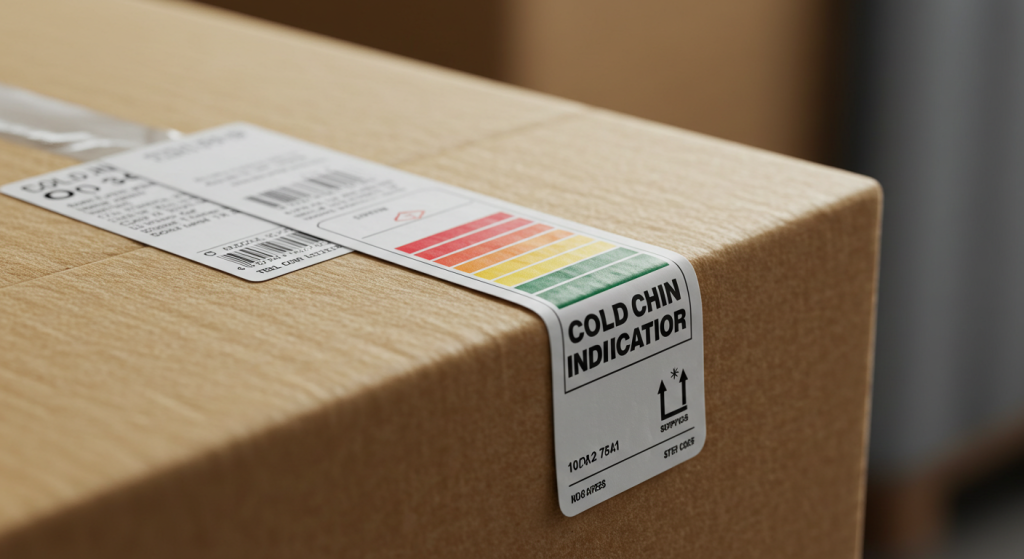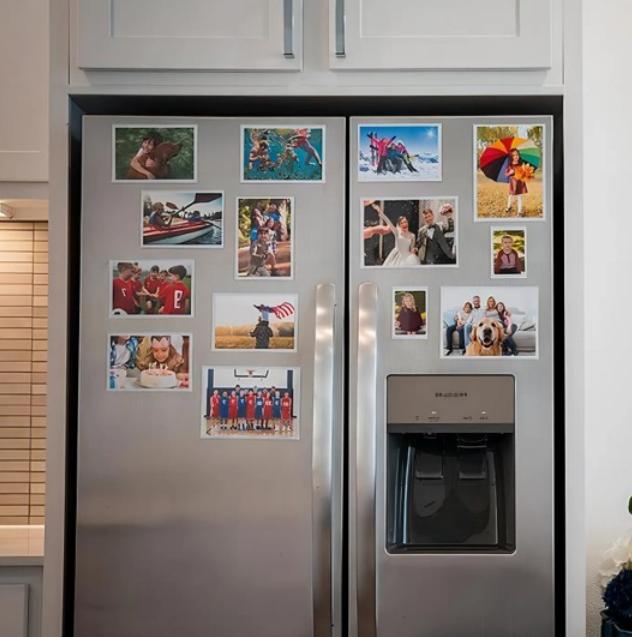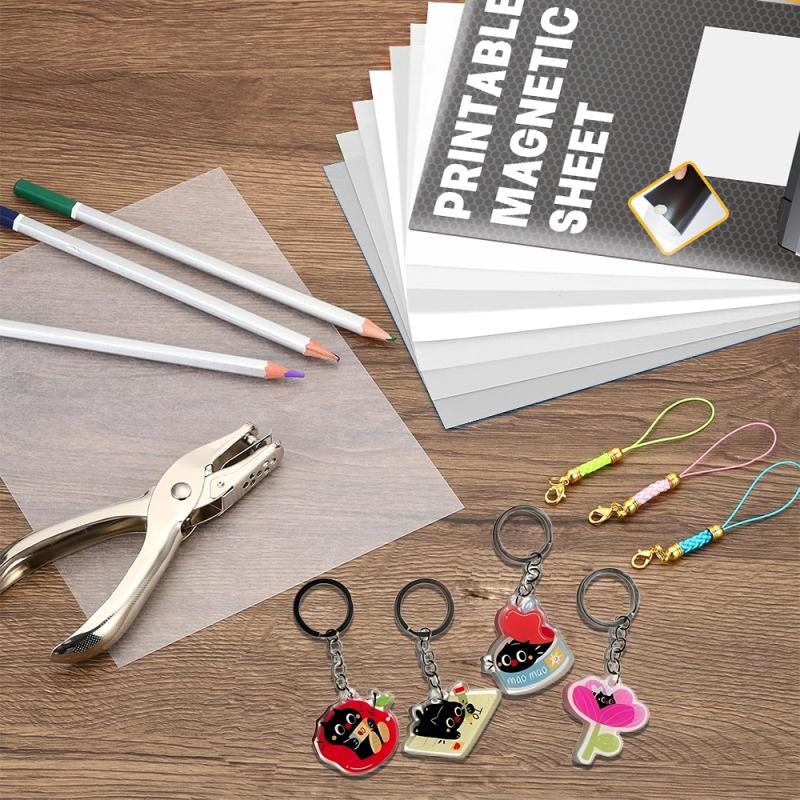Cold Chain Temperature Indicators: Applications & Benefits
By peter, ren
What is a Cold Chain Temperature Indicator?
A cold chain temperature indicator refers to any mark, gauge, sticker, or other device that indicates when the temperature is surpassed during storage or transport.
- It can be a one-use label that will permanently change color (irreversible).
- Or it might be a reversible measure that returns to normal when things are returned to normal.
- Digital or chemical components are some of the indicators.
Its task: to provide visual or recorded evidence of temperature exposure. No guesswork. You see the evidence.
Why Cold Chain Temperature Indicator Devices?
- Safety & Quality Assurance
Storing of biologics, vaccines, or perishable foods at safe temperatures (usually 2 8 o C, and occasionally less or more) is crucial. There were indicators that this range was observed.
- Regulatory Compliance
A lot of health authorities, food safety regulations, and pharma logistics demand the recording or display of temperatures. Conforming cold chain temperature label or sensor assists in satisfying ISO, WHO, FDA, GDP, and other requirements. As an illustration, the WHO suggests the cold chain supply of + 2 to +8 °C in the storage of vaccines.
- Reducing Losses
Thermal excursions cost money to spoil. Indicators assist in the detection of problems at an early stage so that corrective measures can be taken before the problem is expanded.
- Transparency and Trust
Customers or regulators will have confidence when they realize that you work with trustworthy monitors or indicators.
Cold Chain Temperature Indicator Types
You’ll find several types. Choose based on your needs:
- Single-Use Chemical or Colour Change Labels – Inexpensive, easy. Good, where you just need to know whether the shipment was safe.
- Reversible Indicators – To monitor temperature continuously. A storage room is Useful in trucks.
- Time Temperature Indicators (TTIs) – They are time-dependent measures, indicating cumulative thermal stress.
- Data Loggers or Digital Sensors – Provide specific records, usually needed to achieve the highest compliance. They are also expensive and could require power or batteries.

Where Cold Chain Temperature Indicators are Needed?
Here is where they shine:
- Shipments of Pharmaceuticals and Vaccines
Vaccines are fragile. Often stored between 28 °C. When they go beyond that by even the slightest margin, then efficacy reduces. The indicators are used to maintain cold chain temperature. The WHO guidelines consist of cold chain equipment and vaccine mapping. World Health Organization+1
- Food Production and Distribution
Fruits and vegetables, milk, meat, etc, must be safely kept at a certain temperature. Packaging or transport boxes contain a cold chain temperature indicator label that will immediately indicate whether the cooling malfunctioned in a truck or the door was left open.
- Biotech/Lab Materials
Biological samples, reagents, tissues: they may be spoiled by fluctuations in temperature. There is certainty in indicators.
- Cold Storage Warehouses
Shelves, refrigerators, freezers, and even storage areas should be mapped and monitored. Indicators may serve as cheap checkpoints.
- Refrigerated Transport
Trucks, air cargo, sea freight. The indicators contained in containers indicate whether goods have been exposed in transit or not.
Standards and Regulations in the Industry
To comply and save your investment:
- WHO Cold Chain/CTC & ECTC: Rules of the vaccine programs: regulation of working with products at controlled conditions outside of the standard +2 to +8 °C.
- Good Distribution Practice (GDP): In the EU and other areas, there is a requirement for documented temperature control in distribution.
- Storage Equipment and Laboratories Standards of ISO: The temperature mapping devices, certified sensors. The Temperature Mapping Tool of the WHO is useful in mapping storage equipment. World Health Organization.
- FDA/National Health Authorities: They might also need cold chain monitoring labels and sensors, depending on the product.
The Selection of a Cold Chain Temperature Indicator Label
The following are the tips on how to select the right product based on the needs:
- Match Temperature Range: You have a product that should never be allowed to drop below 2 8degC, then not an indicator that starts working at 0degC or 10 °C.
- Determine Whether to Use Decipherable or Undecipherable: Irreversible when it is to be kept as a record and warrantied. Reversible on continuous checks in trucks or in the warehouse.
- Accuracy of the Check: +/-1degC or more. Sensitive goods are better tolerated.
- Evaluate Adhesives: In electronics, medical vials, or metal, adhesives that are adhesive when cold, in liquor, or vibrating.
- Shipping: Waterproofing, chemical, vibration, drop, and durability.
- Readability Convenience: The changing of colors should be observable without any special equipment.
- Storage and Shelf Life: Make sure that indicators are kept in a proper manner before use to prevent pre-activation or drift.
- Documentation & Traceability: Select products, the certificates, batch codes, and data that can be used to support regulatory audits.
Recommended Practices in the Use of Cold Chain Temperature Indicators
- Position the indicator so that it is nearest to the product, and does not contact sensitive surfaces.
- One should not be placed close to cooling vents or open surfaces that can provide misleading results.
- Always place your indicators in a proper room temperature before using; do not expose the indicators to extremes.
- Train personnel to read and understand pointers: understand when and why an indicator is changed with a particular color, and know what to do.
- Temperature measurements at major checkpoints: dispatch, transit, receipt.
Why These Indicators Can Be Assisted with the Help of Crystal Code Sticker?
We are in the business of providing a variety of cold chain temperature labels, sensors, and indicator stickers. What makes us different:
- Custom Temperatures: Set to meet your product requirements.
- Good Quality Materials: Adhesives, thermochromic/chemical indicators, waterproof and durable labels.
- Support on Regulations: International standards and certifications on products.
Conclusion
The cold chain temperature indicator devices, which are used in shipping, are not merely labels, but rather a guardian. Their interest is the protection of the thing: vaccine efficacy, food safety, and product integrity. In the case of any transport where temperature is a concern, one should not compromise on dependable and precise indicators. Match your product’s needs. Check accuracy, durability, and, in case you need trusted solutions, the Crystal Code Sticker is exactly what you are searching for.
- Agodeo inkjet vinyl sticker paper
- AIVA printable vinyl sticker paper
- best inkjet vinyl sticker paper for outdoor use
- cheap printable vinyl sticker paper for outdoor use
- cold chain temperature indicator
- color-change temperature sticker
- Cricut vinyl sticker paper inkjet
- custom vinyl sticker printing
- DIY sticker paper sheets
- durable waterproof sticker paper for inkjet printers
- electronics temperature sticker label
- glossy inkjet vinyl sticker paper
- hot equipment warning sticker
- industrial temperature indicator label
- inkjet sticker paper for Cricut
- matte inkjet sticker paper
- medical temperature indicator sticker
- multi-point irreversible temperature sticker
- Neato vinyl sticker paper
- one-time temperature indicator label
- orajat 1917 printable vinyl
- peak temperature measurement label
- printable vinyl for car decals
- printable vinyl for laptop stickers
- printable vinyl for scrapbooking
- professional quality inkjet vinyl sheets
- reversible temperature monitor label
- self-adhesive printable vinyl
- shipping temperature indicator label
- Tear-resistant sticker paper
- temperature indicator for food safety
- temperature monitoring sticker for transport
- vinyl sticker paper for labels
- waterproof printable vinyl paper
- where to buy inkjet vinyl sticker paper







